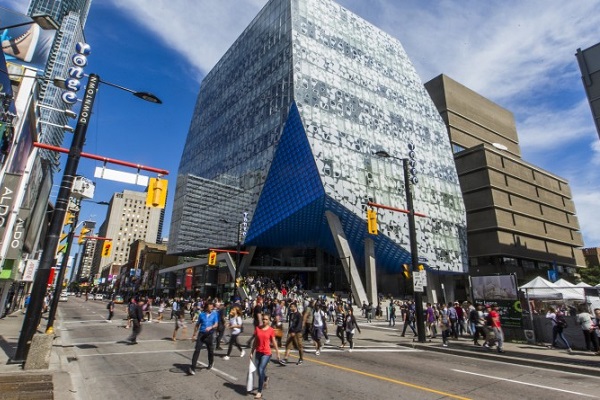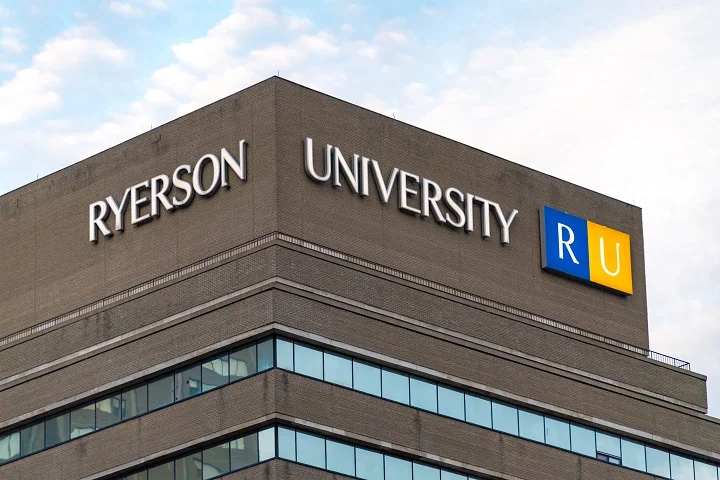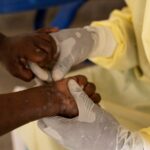Looking for a top-notch research institution to kickstart your career? Look no further than Ryerson University, located in the heart of bustling Toronto, Ontario. With over 130-degree programs spanning engineering, business, arts, science, and design, Ryerson is the best university to pursue your passions and achieve your goals.
- Overview Ryerson University
- Benefits of studying at Ryerson University
- How to get admission at Ryerson University
- 1. Find your undergraduate program.
- 2. Apply online.
- 3. Submit your documents
- Receive your admission decision.
- Accept your offer and prepare for your arrival.
- Scholarships and financial aids
- FAQs
- Where is Ryerson University located?
- What programs does Ryerson University offer?
- Is Ryerson University a public or private institution?
- What are the admission requirements for Ryerson University?
- What is the tuition fee at Ryerson University?
- Does Ryerson University offer scholarships or financial aid?
- Does Ryerson University have on-campus housing?
- What facilities and resources are available to students at Ryerson University?
But that’s not all. Ryerson has recently transformed, changing its name to the Toronto Metropolitan University (TMU) as part of a bold new strategy to become a global leader in education. TMU is committed to diversity, inclusivity, and social justice and is proud to connect to Toronto and international partners. With its innovative curriculum and dedication to preparing students for the challenges of the twenty-first century, TMU is the perfect place to launch your career and make a real impact on the world.
Overview Ryerson University
Did you know that Ryerson University is a fantastic place to study in downtown Toronto, Ontario, Canada? Founded in 1948, it has become one of Canada’s largest universities, with over 43,000 students enrolled. Ryerson is worth considering if you’re looking for a top-notch public research university!
Ryerson strongly emphasizes career-focused education and offers various undergraduate and graduate programs in multiple disciplines. The university has different faculties, which include the Faculty of Communication,the Faculty of Engineering and Architectural Science, the Faculty of Arts and Design, the Faculty of Science, the Faculty of Community Services, and the Ted Rogers School of Management.
The university is known for its innovative and hands-on approach to education, with many programs incorporating practical experience through internships, co-op placements, and industry partnerships. Ryerson strongly emphasizes entrepreneurship and innovation, and its DMZ (Digital Media Zone) is Canada’s largest incubator for tech start-ups.
Overall, Ryerson University is known for its practical, career-oriented programs, entrepreneurial spirit, and central location in downtown Toronto. Students receive a one-of-a-kind educational experience that blends academic excellence with practical experience and chances for individual and career advancement.

Benefits of studying at Ryerson University
Discover the many advantages of pursuing your education at Ryerson University!
- You will get a career-focused education that prepares you for the real world. Ryerson offers more than 130 undergraduate and graduate programs in various fields of study, such as engineering, business, arts, science, and design. Many programs are hands-on and experiential, meaning you will learn by doing and applying your skills in practical settings. You will also have access to cooperative education, internships, placements, and industry leaders as guest speakers and professors.
- You will be part of a diverse, inclusive community that values social justice. Ryerson has a diverse student population, representing over 140 countries. The university is committed to fostering a culture of respect, equity, and inclusion for all its members. At Ryerson, numerous programs and services are available to support students from diverse backgrounds. These include the Office of the Vice-President of Equity and Community Inclusion, the Center for Student Development and Counseling, the Tri-Mentoring Program, and International Student Support.
- You will enjoy the vibrant and dynamic life of downtown Toronto. Ryerson is located in the heart of Canada’s largest and most multicultural city, where you can find endless opportunities for entertainment, culture, sports, tourism, and more. You will be far from iconic landmarks such as the CN Tower, the Eaton Centre, Yonge-Dundas Square, and the Art Gallery of Ontario. You can also explore Toronto’s diverse neighborhoods and cuisines, such as Chinatown, Little Italy, Kensington Market, and Greektown.
How to get admission at Ryerson University
If you are interested in applying to TMU, here are some steps you need to follow:
1. Find your undergraduate program.
TMU offers more than 125 undergraduate programs in various disciplines, such as engineering, business, arts, science, and design. You can browse the list of programs on their website and find the one that matches your interests and goals. You can also check each program’s admission requirements, tuition fees, and application deadlines.
2. Apply online.
You can apply to TMU through the TMU International Application Portal or Ontario Universities’ Application Centre (OUAC). The TMU International Application Portal is for international students not currently studying in an Ontario high school. The OUAC is for students currently studying in an Ontario high school or previously applying to an Ontario university. You can choose the portal that suits your situation and follow the instructions to complete your application. You must pay an application fee of CAD 150 for the TMU International Application Portal or CAD 156 for the OUAC.
3. Submit your documents
Depending on your program and country of origin, you may need to submit additional documents to support your application. These may include academic transcripts, English language test scores, standardized test scores (such as GMAT or GRE), statements of interest, a resume/CV, letters of recommendation, an interview, or supplementary form. You can find the specific document requirements for your program on their website or contact the International Enrollment Office for assistance.
Receive your admission decision.
After you submit your application and documents, TMU will review your eligibility and competitiveness for admission. Once the admission decision is made, you will receive an email notification. Additionally, check your application status on the same portal you used to apply. If you are accepted, you will receive an offer letter with details about your program, fees, and conditions of admission.
Accept your offer and prepare for your arrival.
If you accept your offer from TMU, you must confirm your acceptance online through the portal you used to apply by the deadline indicated in your offer letter. You must also pay a non-refundable tuition deposit of CAD 600 to secure your spot. After accepting your offer, you must prepare for your arrival in Canada. This may include applying for a study permit and visa, arranging your accommodation and health insurance, booking your flight and airport pickup, and attending orientation sessions.

Scholarships and financial aids
Different types of scholarships and awards are available for international students who want to study at TMU, depending on their academic achievements, leadership qualities, financial needs, and program of interest. Some of the scholarships and awards are:
- Guaranteed and Renewable Scholarships: International students who maintain a final admission average of 80% or higher and fulfill the terms and conditions for scholarship renewal are eligible for automatically awarded scholarships. The scholarship amount, ranging from $500 to $4,000 annually, depends on the admission average and can be renewed for up to four years.
- Prestigious Entrance Awards: These scholarships are highly competitive and require applicants to showcase their academic excellence, leadership potential, original thinking, and creativity. They are specifically designed for exceptional international students. Some of the prestigious entrance awards are the President’s Entrance Scholarship ($40,000), the Terence Grier Entrance Scholarship ($20,000), the International Secondary School Merit Scholarship ($5,000), and the International Secondary School Student Leader of Tomorrow Award ($3,000).
- Awards and Scholarships for Ryerson Students: These are scholarships and bursaries available for current TMU students who have completed at least one semester of full-time studies. These awards are based on academic performance, financial need, extracurricular involvement, or other criteria. Some examples are the International Student Support Award ($1,500), the International Student Experience Award ($1,000), and the International Student Leadership Award ($500).
FAQs
Where is Ryerson University located?
Ryerson University is located in downtown Toronto, Ontario, Canada.
What programs does Ryerson University offer?
Ryerson University offers various programs in various fields, including arts, business, engineering, science, health sciences, and media. Some popular programs include business management, computer science, nursing, journalism, and architecture.
Is Ryerson University a public or private institution?
Ryerson University is a public research university funded by the government of Ontario. It was established in 1948 and has since grown to become one of Canada’s top universities.
What are the admission requirements for Ryerson University?
Admission requirements for Ryerson University vary depending on the program of study. Generally, applicants are required to have completed specific high school courses and meet minimum grade requirements. Some programs may also require supplementary applications or interviews.
What is the tuition fee at Ryerson University?
Tuition fees at Ryerson University vary depending on the program and level of study. As of the 2021-2022 academic year, undergraduate domestic students can expect to pay approximately $7,000 – CAD 10,000 per year, while international students can expect to pay around $27,000 – CAD 36,000 per year.
Does Ryerson University offer scholarships or financial aid?
Yes, Ryerson University offers eligible students various scholarships, bursaries, and financial aid options. These opportunities are based on academic achievement, financial need, extracurricular involvement, and other criteria.
Does Ryerson University have on-campus housing?
Yes, Ryerson University offers on-campus housing options for students. Several residences and apartment-style accommodations are available, providing various living arrangements for students.
What facilities and resources are available to students at Ryerson University?
Ryerson University provides numerous facilities and resources to support student learning and well-being. These include libraries, research centers, laboratories, computer facilities, athletic facilities, health services, counseling, career services, and student clubs and organizations.














